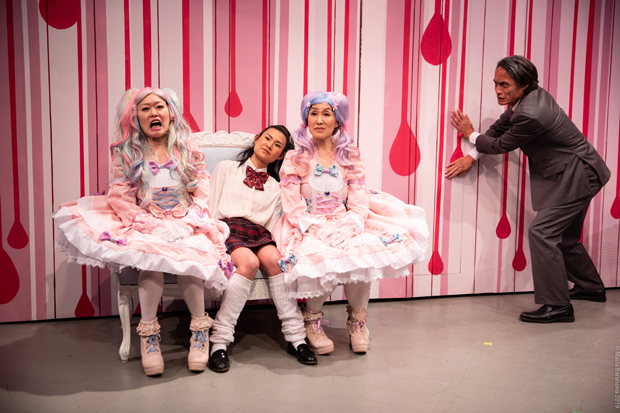THE HANGOVER REPORT – Haruna Lee’s SUICIDE FOREST makes for terrifically strange, emotionally naked theater
- By drediman
- March 15, 2019
- No Comments

Akiko Aizawa, Kristine Haruna Lee, Dawn Akemi Saito, and Eddy Toru Ohno in Kristine Haruna Lee’s “Suicide Forest” at the Bushwick Starr, in a co production with Ma-Yi Theater Company. Photo by Maria Baranova.
As an Asian American, I’ve gone out of my way to seek out works by people like myself, whose stories are unfortunately rarely represented in the theater, by and large. And of the theater companies that focus on presenting works by and for this specific and underserved demographic, Ma-Yi Theater Company quickly comes to mind and gets my vote as the most exciting of the lot. Indeed, the troupe has consistently impressed me with the freshness and authenticity of the voices they’ve championed, as well as the polish of their stagings (Lloyd Suh’s The Chinese Lady, Mike Lew’s Teenage Dick, and Woodshed Collective and other’s KPOP were all excellent, striking experiences). Last night, I caught Ma-Yi’s production of Haruna Lee’s Suicide Forest at the Bushwick Starr (the show’s equally notable co-presenter), which happily continues the trend.
Ms. Lee’s bilingual play (it’s performed in both English and Japanese) is a knotty, hallucinatory fantasia which calls to mind the psychedelic stream-of-conscience dreamscapes of Lewis Carroll’s much-loved “Alice” works. Suicide Forest begins with a series of vividly satirical scenes – at once audaciously performed and impressively disciplined – akin to a Japanese version of a clichéd minstrel show (complete with drunken businessmen, giggly schoolgirls, and of course, a good dose karaoke). As the piece unfolds, these stereotypes and skin-deep cultural associations become increasingly menacing and dangerous, until the the play itself cracks open (or does it?), unexpectedly revealing the raw, open wound that is the playwright herself. What ensues is a painfully honest and haunting confessional from a young woman caught between two vastly different cultures.
The production, directed by Aya Ogawa, is as rambunctious as Ms. Lee’s text. Her staging embraces the terrific strangeness and emotional nakedness of the play, while maintaining an invigorating sense of pace and noticeably high quality. Indeed, Suicide Forest is never less than fascinating to watch, even when Ms. Lee’s writing becomes a little too self-consciously surreal for my taste. The cast, which is completely comprised of performers of Japanese heritage, is superb. Each of them fully embodies the Japanese culture but also sharply comments on it, signifying some rather sophisticated acting. Although I liked some parts of the show a tad more than others, the ending embrace between ghostly mother and haunted daughter (played by none other than the playwright herself and her mother) is one of the most ambiguous images – both wrathful and tender – I’ve come across in the theater in recent memory. Suicide Forest is fearless theater.
HIGHLY RECOMMENDED
SUICIDE FOREST
Off-Broadway, Play
The Bushwick Starr, in a co-production with Ma-Yi Theater Company
1 hour, 30 minutes (without an intermission)
Through March 23

 Copyright © 2025
Copyright © 2025
Leave a Reply